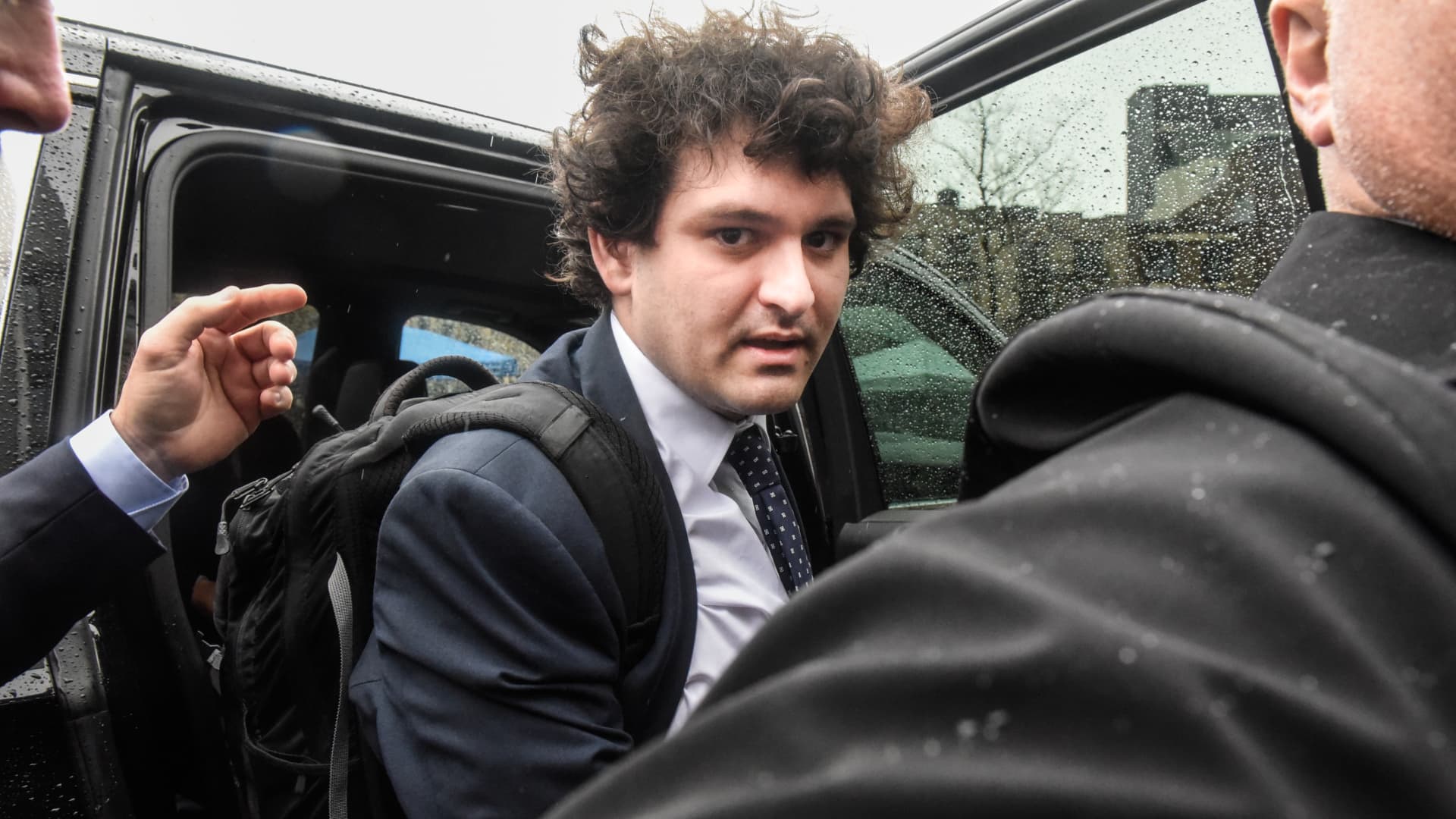Sam Bankman-Fried pleaded not guilty in New York federal court Tuesday to eight charges related to the collapse of his former crypto exchange FTX and hedge fund Alameda Research.
The onetime crypto billionaire was indicted on charges of conspiracy to commit wire fraud and securities fraud, individual charges of securities fraud and wire fraud, money laundering and conspiracy to avoid campaign finance regulations.
Judge Lewis Kaplan proposed Oct. 2 as the start date for Bankman-Fried’s trial.
Bankman-Fried arrived outside the courthouse in a black SUV and was swarmed with cameras from the moment his vehicle arrived. The scrum grew so thick that Bankman-Fried’s mother was unable to exit the vehicle, falling onto the wet pavement as cameras scrambled to catch a glimpse of her son.
Bankman-Fried was hauled by security through the throng and into the courthouse in a matter of moments, with photographers scrambling to get out of the way.
Earlier in the day, attorneys for Bankman-Fried filed a motion to seal the names of two individuals who had guaranteed Bankman-Fried release on bail with a bond. They claimed that the visibility of the case and the defendant had already posed a risk to Bankman-Fried’s parents, and that the guarantors should not be subject to the same scrutiny. Kaplan approved the motion in court.
Federal prosecutor Danielle Sassoon told the court that Bankman-Fried had worked with foreign regulators to transfer assets that FTX’s U.S. management had been attempting to recover through the Chapter 11 bankruptcy process.
Regulators in the Bahamas and FTX’s U.S. lawyers have been fighting for weeks in Delaware bankruptcy court over hundreds of millions, if not billions, of dollars worth of cryptocurrency. FTX’s attorneys insist that Bahamian regulators have illicitly transferred hundreds of millions of dollars, and that Bankman-Fried assisted them.
Bahamian regulators say that local laws give them jurisdiction over those assets, and dispute the validity of the U.S. Chapter 11 proceedings.
Federal prosecutors appear to agree with FTX’s U.S. attorneys. Sassoon asked Kaplan to impose a new restriction barring Bankman-Fried from transferring or accessing FTX customer assets. The judge approved that motion as well.
Bankman-Fried returned to the U.S. from the Bahamas on Dec. 21, and the next day was released on a $250 million recognizance bond, secured by his family home in California.
Federal prosecutors also announced the launch of a new task force to recover victim assets as part of an ongoing investigation into Bankman-Fried and the collapse of FTX.
“The Southern District of New York is working around the clock to respond to the implosion of FTX,” U.S. Attorney Damian Williams said in a statement Tuesday.
The U.S. attorney’s office for the SDNY had argued that Bankman-Fried used $8 billion worth of customer assets for extravagant real estate purchases and vanity projects, including stadium naming rights and millions in political donations.
Federal prosecutors built the indictment against Bankman-Fried with unusual speed, packaging together the criminal charges against the 30-year-old in a matter of weeks. The federal charges came alongside complaints from the Commodity Futures Trading Commission and the Securities and Exchange Commission.
They were assisted by two of Bankman-Fried’s closest allies, Caroline Ellison, former CEO of his hedge fund Alameda Research, and Gary Wang, who co-founded FTX with Bankman-Fried.
Ellison, 28, and Wang, 29, pleaded guilty on Dec. 21. Their plea deals with prosecutors came after rampant speculation that Ellison, Bankman-Fried’s onetime romantic partner, was cooperating with federal probes.
Another former FTX executive, Ryan Salame, apparently first alerted regulators to alleged wrongdoing inside FTX. Salame, a former co-CEO at FTX, flagged “possible mishandling of clients’ assets” to Bahamian regulators two days before the crypto exchange filed for bankruptcy protection, according to a filing from the Securities Commission of the Bahamas.
Bankman-Fried was accused by federal law enforcement and financial regulators of perpetrating what the SEC called one of the largest and most “brazen” frauds in recent memory. His stunning fall was precipitated by reporting that raised questions on the nature of his hedge fund’s balance sheet.
In the weeks since FTX’s Nov. 11 Delaware bankruptcy filing, the extent of Bankman-Fried’s alleged malfeasance has been exposed. Replacement CEO John J. Ray said there was a “complete failure of corporate control.“
Bankman-Fried was indicted in New York federal court on Dec. 9, and was arrested by Bahamas law enforcement at the request of U.S. prosecutors on Dec. 12. Following his indictment, Bankman-Fried’s legal team in the Bahamas flip-flopped on whether or not their client would consent to extradition.
